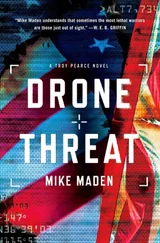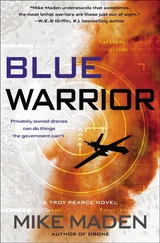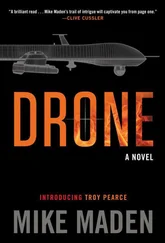Six years. It seemed like an eternity ago, until now. Memories of Lisbon washed over him. Now he knew why she didn’t stay with him. But what did that mean now? He didn’t know what to say to her. He fell back on his combat training. Fail forward.
“Your daughter is beautiful.”
“She will be spoiled rotten by the time I see her again. My father is a maniac. He has probably already bought her a horse, and maybe even a castle in the Tyrol to hide her from me.”
Low Tuareg voices called out. The camels stopped.
“What is happening?” Cella asked.
Early jogged toward them from the front. His sling was gone, but he clearly favored his injured arm.
“The boss wants to see you.”
“Problem?”
“Could be. Scout just came back.”
———
Pearce, Early, and Mossa lay flat on the crest of a dune next to the scout, a young Nigerian Tuareg named Iskaw. Towering chimneys of granite loomed a half mile ahead. The dunes were like waves of a rolling sea of sand washing up against the rocks.
Mossa held a pair of mil-spec binoculars to his eyes. He conferred with the scout in whispered Tamasheq, then handed the binoculars to Pearce. “Take a look. Just inside the rocks.”
Pearce glanced through the glass, but he hardly needed to. The small flickering campfire was easily seen by the naked eye. The firelight danced off of the tall stone columns above, almost like a strobe.
“Do you see him?” Mossa asked.
Pearce adjusted the focus. Now a shadow came into view. It stood in front of the fire, its back to Pearce. Couldn’t see his face. He wore Western clothes. Definitely not a Tuareg.
“A European,” Mossa said.
“I can’t make him out.” Pearce thought he saw a beard on the man’s face.
“The scout saw him clearly earlier. Swears he is a European. Tall, bearded.”
“Anyone with him?”
“No. By himself, out here. Very strange.”
Pearce handed the glasses back. “Can we go around him?”
“No, our camp for the night is just past his position.”
“Why there?”
“Water.”
“We can take him out,” Early said.
“But he may be innocent,” Mossa said.
“Out here? Maybe.” The big former Ranger wasn’t into taking chances these days.
“Only one way to find out.” Pearce rose. “You three wait here. If he cuts my head off, he’s probably a bad guy.”
 51
51 
Tassili du Hoggar
Tamanghasset Province, Southern Algeria
12 May
Pearce crept to within ten feet of the man by the campfire, his back still toward him. The air was sweet with the tang of burnt camel dung crackling in the flames.
“I thought you were a cautious man,” Pearce said. “I’m surprised you let me sneak up on you like that.”
August Mann turned around, a cell-phone-sized monitor in his hand and a grin on his dark, bearded face.
“No surprises. I’ve been tracking you with this SPAN. You can tell all of your friends to come out now.” Mann’s German accent punctuated his faultless English.
SPAN was a self-powered wireless ground sensor network. Mann had scattered the tiny sensors like seeds all around the area. Anyone who came near enough to one of the sensors lit up on his monitor, which was linked to a portable sUAV Mann had deployed overhead.
“Just you?” Pearce asked.
“One war, one German. What else do you need?”
Pearce laughed. The two old friends shook hands, grinning, warriors in the field together again. A brilliant engineer and a fearless fighter, Mann was Pearce Systems’ very first hire and now headed up their nuclear deconstruction operations in Europe deploying unmanned ground vehicles (UGVs). It was good to have him here. The lanky German came from a long, proud line of military men. His grandfather had commanded a PZKW IV in Rommel’s Afrika Korps. Mann served briefly as a tanker with the Federal Republic’s Bundeswehr, too, before helping to develop their first combat UGVs.
“I assumed you’d bring some friends along,” Pearce said.
“I did.”
“Where are they?”
Mann pointed in the distance. “Out there, lurking in the gloom, keeping an eye on things.”
Like Pearce, Mann preferred the civilian side of drone operations these days, but when wet work was necessary he was the first to answer the call, usually relying on a cadre of trusted East European operators to assist him.
“How many?”
“Six.”
“How good?”
“Untested. But reliable.” Mann glanced at his monitor again. “How many with you?”
“Thirteen, plus one extra camel. Yours, as per your request.”
Mann showed him the monitor. “There are fourteen persons out there.” One blip was far from the others.
“Looks like we have company.”
“Problem?” Mann asked.
“Nothing but.”
Mann tapped his screen. A moment later, a shotgun blast echoed in the night. Mann smiled. “No more problems.”
“Reliable, and now tested.”
“Yes.”
“Thanks for coming, August. No telling what’s waiting for us up ahead.”
After Mossa had laid out the route from the Adrar des Ifoghas to the airstrip, Pearce was able to pass along the GPS coordinates to Ian, Mann, and Judy along with an estimated schedule of arrival times—just in case they lost radio communications. Mann had promised to arrive here at the Tassili du Hoggar with whatever reinforcements he could bring. He and his team had parachuted in just hours before. Judy was still scheduled to pick them all up in the Aviocar three days from now.
Pearce whistled in Early and the others out of the dark. Mann was introduced to Mossa and the rest of the caravan, along with the unburdened camel that had been brought along for him. One of Mossa’s men checked the corpse in the sand. He brought back an assault rifle and a pair of night-vision goggles smeared with blood to Mossa.
“He says it was an Arab,” Mossa said. “No stone.”
“What does that mean?” Mann asked.
“Shi’a pray with a stone,” Pearce said. “Sunnis don’t. Neither do Salafists. AQS is Salafist.”
They all pushed on toward the oasis farther into the narrow granite canyons, their tall spires scraping against a luminous moon. Soon there would be food and water, and then they could all bed down for the night. Mann’s aerial drone and ground team would keep watch over the caravan.
Pearce was exhausted, mostly from the heat. For the first time in his life he felt like he was getting too old for the field, but there was nowhere else he’d rather be, trudging through the desert beneath a canopy of stars in the company of brave companions.
 52
52 
Tamanghasset Province
Southern Algeria
13 May
The kneeling camels were bedded down for the night, as were the weary Tuaregs. A small campfire had burned itself down to red embers, but the air was still warm in this part of the desert. They were far enough out in the wilderness that there wasn’t much chance of encountering anyone else. Only someone who knew exactly where they were could possibly find them.
Unfortunately, someone had.
Karem Air Force Base
Читать дальше

 51
51 











